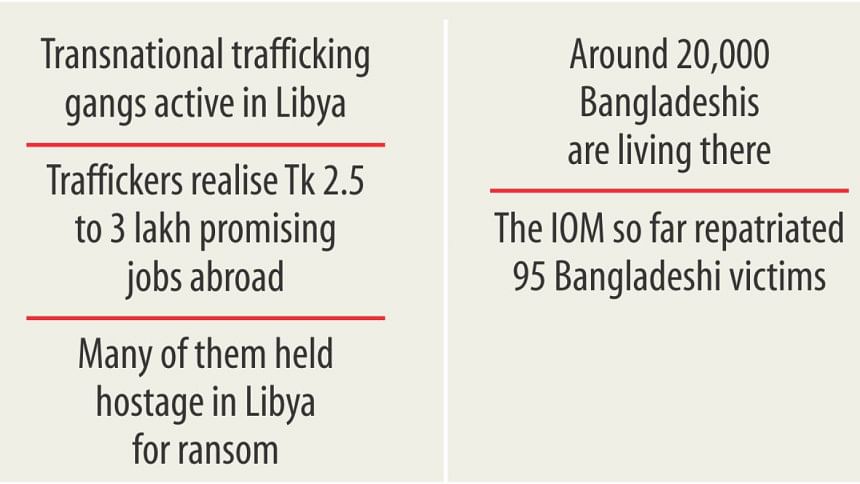Fortune seekers trapped in Libya

Luring Bangladeshis with lucrative jobs abroad, transnational human trafficking gangs are taking hundreds of people to war-torn Libya, and are holding them hostage there for ransom, torturing them, and using them as slaves.
The gangs get tourist visas of Sudan, Dubai or Egypt for the victims and then fly them to Libya with fake visas from the countries, according to survivors and officials concerned.
The migrants are then held hostage and tortured for ransom. Those wishing to go to Italy are made to pay hefty sums and put on rickety boats in the Libyan coast.
The others are just sold to other criminal gangs or are left there in the country that has been in anarchy since Muammar Gaddafi was ousted.
Their ordeal does not end there. Many of them get kidnapped by gangs and are handed over to their Bangladeshi cohorts who again collect ransom for their release.
Lt Col Tuhin Mohammad Masud, commanding officer of Rab-3 that is probing human trafficking cases, said traffickers realise Tk 2.5 to 3 lakh for jobs in Libya. Once the victims reach Libya, criminals hold them hostage for ransom, which ranges between Tk 4 lakh and Tk 10 lakh.
"If they fail to pay the amounts, they are sold again to other criminal groups," Masud said.
HOW IT HAPPENS
Mohammad Ilias, 45, of Kahalu in Bogra, said a broker promised him a job in Sudan in exchange for Tk 4 lakh.
But early June last year, he was flown to Libya via Dubai and Sudan.
"We were taken to a building [in Tripoli]. We found 100 other Bangladeshis there. A broker named Hossain took 12 of us to the third floor and demanded money," he said.
Hossain demanded Tk 4.5 lakh and threatened him with confinement and tortures unless the payment was made. The broker then called Ilias' wife Nurunnahar Nipa and made similar threats.
"As my family needed time to gather the money, I was beaten up with a chain several times. They were cruel. They beat up fellow Bangladeshis in front of me and made video calls to their relatives at home on IMO [a messaging and video conference app] to show their tortures," Ilias said.
He said his wife borrowed from banks and relatives and paid Hossain's cohort Idris of Jessore in two weeks.
Ilias was then sent to a bread factory where he was made to work nearly 20 hours a day without pay. He asked the factory owner to send him home as his health was deteriorating, but was denied.
"The factory owner demanded $5,000. I was undone," Ilias said.
Several months passed by and he could not send a penny to his wife to repay the loans. His wife Nurunnahar died of stroke on December 1 last year, leaving their 12-year-old son all alone.
"I went crazy and rushed to the employer to show the photo of my dead wife," he said.
The employer then freed him, gave his passport back, but did not pay him for the work he had done.
He then contacted some people of Bogra living in another Libyan province and stayed with them.
After over two months, his brother sent him some money and he was able to return home on February 26. "I am now deep in debt," he said.
About the same time Mohammad Ilias left Bangladesh, Ruhul Amin, 40, of Madaripur, went to Libya.
Ruhul told The Daily Star that his family had to pay ransom twice, totalling Tk 6 lakh, as he was held hostage by criminals.
Finding no hope in Libya, he, along with some other Bangladeshis, decided to go to Italy paying Tk 60,000 more. However, their boat, with some 40 Bangladeshis and 80 Africans, was stopped by the Libyan coastguards in the Mediterranean.
They were then imprisoned in Libya for nearly five months before the International Organisation for Migration (IOM) facilitated their return on March 8.
The IOM repatriated 95 Bangladeshis until March 8 this year.
There are others who remained stranded in chaotic Libya. Abu Sayeed, 45, of Jatrabari in Dhaka, who travelled to Libya with Mohammad Ilias, is one of them.
He spent Tk 3 lakh to go to Libya, but as he was held hostage, his wife Maksuda Islam had to borrow Tk 1.5 lakh to buy his freedom from the traffickers in Tripoli.
Sayeed then moved to Misrata, Libya, but could not return home as no one could send him any money.
Maksuda is now struggling to make ends meet with two sons, seven and nine years old.
"I talked to my husband a month ago and I just cried … since then there was no communication," she said.
KIDNAPPING FREQUENT
Bangladeshi Rafiq Haider, who has a business in Tripoli, said a section of Bangladeshis and Libyans team up to kidnap Bangladeshis who cannot send money home as remittance houses in Libya are closed.
There were many instances in which Libyans kidnapped migrants and handed them over to their Bangladeshi cohorts for money. The Bangladeshi criminals then held them hostage for ransom.
Ashraful Islam, labour counsellor of the Bangladesh embassy in Tripoli, said the mission recorded some 300 cases of kidnapping of Bangladeshis in 2016. The actual number of kidnapping cases would be several times more, he said.
An estimated 20,000 Bangladeshis are still in Libya, and they are either waiting to return home or cross the Mediterranean to reach Italy, said Ashraful.
According to the IOM, 521 people from 10 countries, including Bangladesh, died in the Mediterranean between January 1 and March 9 this year. The death toll of Bangladeshis was not known.
During this period, 1,303 Bangladeshis managed to reach Italy. The number was 8,131 in 2016, up from 5,040 in 2015 and 4,386 in 2014, it said.
Libya banned Bangladeshi migrant workers in mid 2015.

 For all latest news, follow The Daily Star's Google News channel.
For all latest news, follow The Daily Star's Google News channel. 



Comments